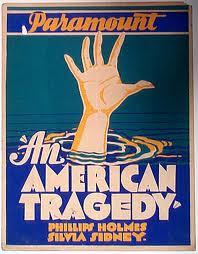
AN AMERICAN TRAGEDY
US, 1931, 95 minutes, Black and white.
Phillips Holmes, Sylvia Sidney, Frances Dee, Irving Pichel, Frederick Burton, Claire Mc Dowell.
Written and directed by Josef Von Sternberg.
An American Tragedy is an early film version of Theodore Dreiser's classic novel. German director Josef Von Sternberg seems an unusual choice to direct this film. He had made several films in the U.S. in the late '20s but was more noted for his work in Germany, especially The Blue Angel. Coming to Hollywood in the early '30s, he was to make a series of eccentric and famous films with Marlene Dietrich.
Phillips Holmes is very good as the moral coward, Clyde. Sylvia Sidney is touching as Roberta. Frances Dee is the fashionable Sondra. Director Irving Pichel is the prosecutor.
The title raises the questions of the possibility of tragedy in America (the question about Death of a Salesman). This is an ordinary young man, with possibilities in life, who makes choices based on ambition and selfishness. He is entangled in relationships and resorts to murder. A major part of the film is devoted to the trial and his being found guilty.
The film was remade lavishly by George Stevens 20 years later as A Place in the Sun with Montgomery Clift, Shelley Winters and Elizabeth Taylor. It won many Oscar nominations and received Oscars for best screenplay and direction.
This is early sound film-making - the film is of interest in itself because of its adaptation of Dreiser but also for the work of Von Sternberg and the development of cinema techniques.
1. Impact of the film? Early sound film? Interest in themes and style?
2. The work of Von Sternberg, his choice to direct this piece of Americana? Black and white photography, cinematic style, editing, score?
3. The work and perspective of Theodore Dreiser? The possibility for an American tragedy? Ordinary Americans and their `nobility', their flaws? Freedom and choices? The American ethos, the American dream? Work ethic and success? American moral atmosphere?
4. Clyde and his life, his mother and father and their religiosity, running the shelter? His work as a bellboy, his being pleased by the rich girl's tip? Hopes and ambitions? His friends? Selfish decisions? His ideas? The experience of the hit-run accident and his leaving, refusing to take any responsibility, no showing of compassion?
5. The move to Chicago, the Griffith connection, going to Lycurgus, New York, work in the factory, his position? His job, the social visit and the family connections?
6. The use of silent screen techniques in the early part of the film with captions and information? The more fluid development later?
7. Clyde as a type, moral coward? The meeting with Roberta, the interview, training her? At work, her innocence, flirting with her? The secrecy about their meetings? The lyrical outings? Pressurising her to go to the apartment, her finally giving in? Meeting Sondra, high society, enjoying it, standing up Roberta? Self-centred?
8. Roberta's pregnancy, wanting to know what to do, her return home? His weakness? The phone calls? Seeing the headlines about the drowning? His plan, the arrangements, taking Roberta out, on the lake, the picnic, the photos? About to kill her, changing his mind, telling her? The struggle and the accident, his not swimming to save her?
9. Going to Sondra, enjoying the holiday camp? His arrest and wanting to keep it quiet? His mixture of truth and lies?
10. The court case, the lengthy cross-examination, the truth about his weaknesses, the defence as a moral coward? Ambitions, fears, mixed memories, inaccuracies? The costs, the boat, a camera? His intentions and change of mind? The pressure of the case? The witnesses?
11. The court and the prosecutor's skill, the relentlessness cross-examination?
12. His mother and her religiosity, blaming herself, the interviews, coming as a reporter?
13. The Griffiths and Sondra, their judgments about his moral worth?
14. The media, headlines, radio?
15. The verdict and Clyde as guilty, in prison, the visit of his mother, telling the truth about himself, his not saving Roberta when he could have?
16. American tragedy, the ordinary man, weakness, destroyed by his own choices?